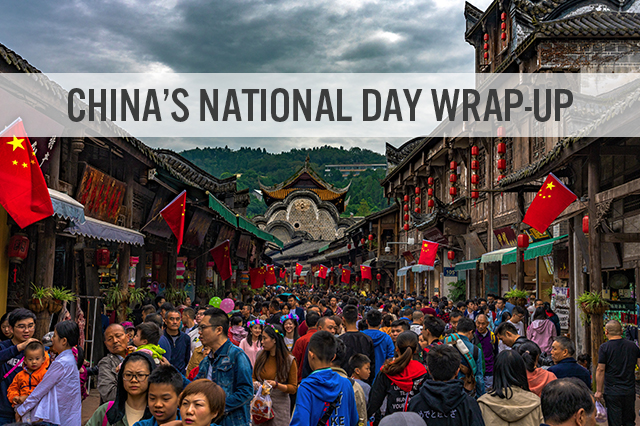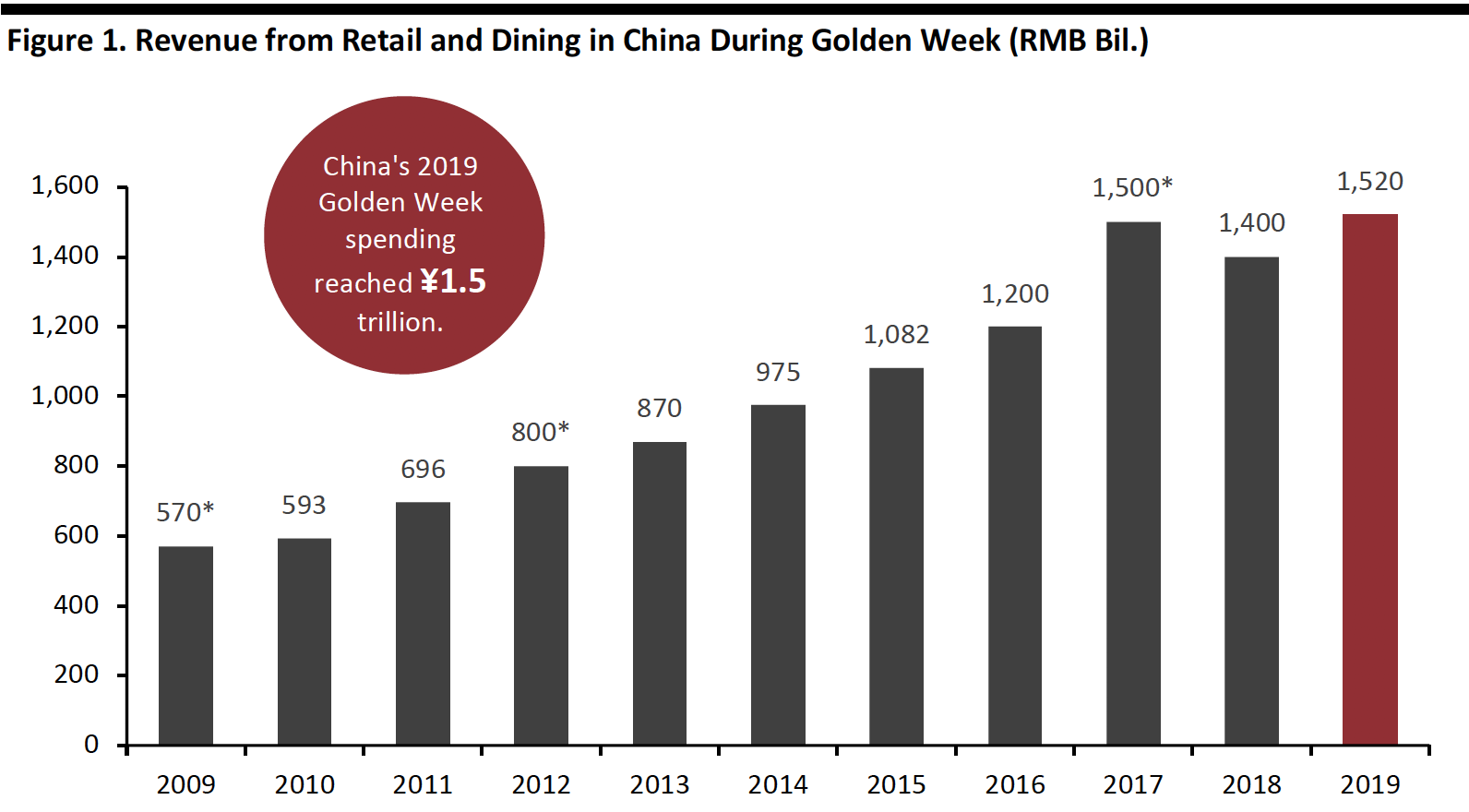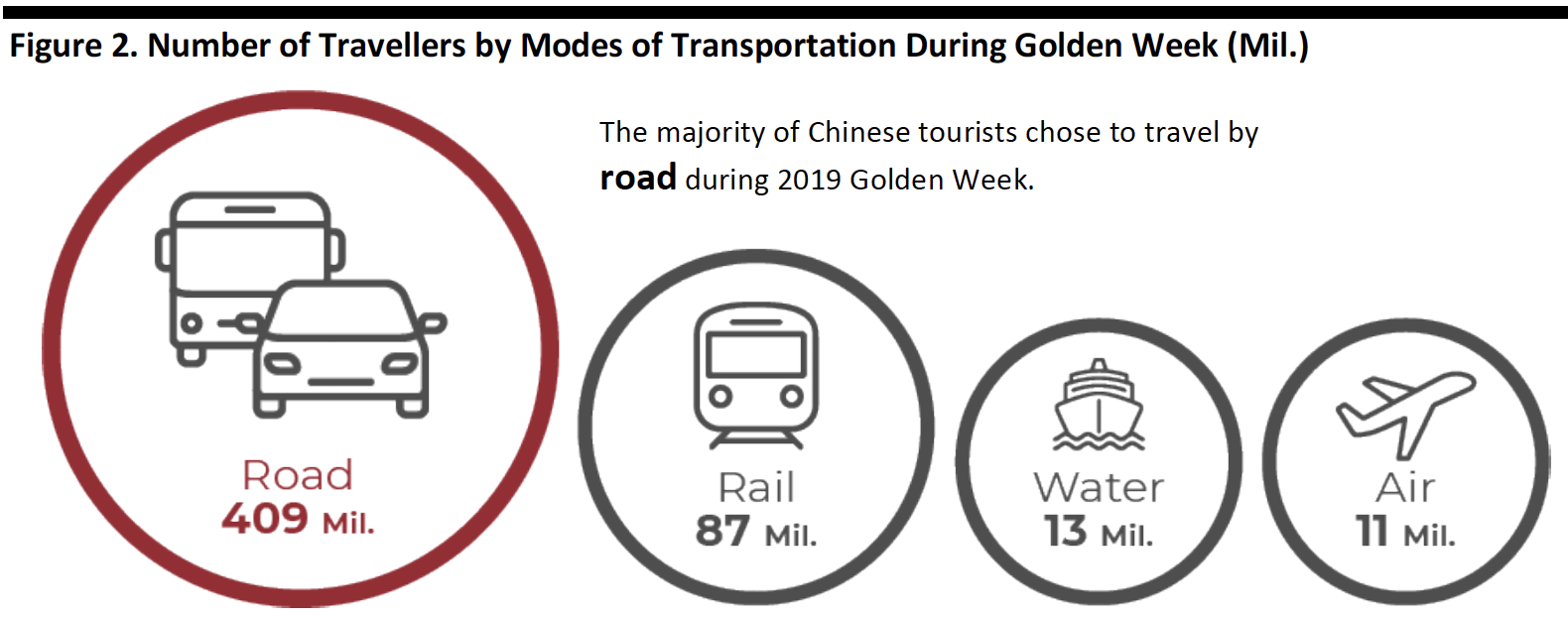
albert Chan
China’s National Day has become a seven-day holiday, running October 1-7 every year. The holiday is popularly known as “Golden Week,” and during which millions of people travel and spend on leisure activities.
In Golden Week 2019, overall revenue from retail and dining in China reached ¥1.5 trillion ($212.6 billion), up 8.5% year over year, according to the Ministry of Commerce. This compares favorably to the drop of 6.7% during the National Day holidays last year, which was the only decline since 2009 when the data first became publicly available.
[caption id="attachment_97980" align="aligncenter" width="700"] *Denoted reported National Day holiday periods longer than October 1-7, which included the Mid-Autumn Festival. Due to the proximity of Mid-Autumn Festival and National Day holidays, some consumers combined these two holidays to have longer holidays.
*Denoted reported National Day holiday periods longer than October 1-7, which included the Mid-Autumn Festival. Due to the proximity of Mid-Autumn Festival and National Day holidays, some consumers combined these two holidays to have longer holidays.Source: China’s Ministry of Commerce/Coresight Research[/caption]
China Saw a Robust Retail Sector During the Holidays
Online and offline retailers saw sales spike during Golden Week. Categories such as apparel, instant food and wine performed well. The Ministry of Commerce monitored retail performances across multiple cities in China during the holiday, and reported that sales of clothes by major offline retailers in Qinhuangdao (a city in Hebei Province) and Lanzhou (a city in Gansu) increased by 13% and 10% respectively year over year.
On e-commerce platform Tmall, the sales of instant food saw huge growth. For instance, between October 1 and 3, sales of instant noodles increased by 101.9% year over year, according to the company. Sales of instant hot pots increased by 128.3% year over year in the same period, and sales of instant rice increased by 122.2% year over year.
On another e-commerce platform, Suning.com, instant food also performed well. Sales of instant noodles increased 93% year over year during the holidays, and instant hot pot sales grew 137% year over year.
Baijiu (literally “white liquor”), the national drink of China, was also a popular product during the holidays. Baijiu is distilled from grains such as sorghum, rice or wheat, which are fermented with fermentation starter jiuqu, including different moulds, yeasts and bacteria. Tmall reported that sales of baijiu saw a 1,100% increase year over year. Around 3 million consumers on Tmall ordered Maotai, which is China’s top baijiu brand during the holidays. Similarly, the sales of baijiu on Suning.com saw 96% growth year over year.
Increased Travel Revenue but Dimmed Growth Rate
During the seven-day holidays, we saw an increasing number of Chinese tourists travel across the nation. Although strong, the growth rate was lower compared to previous years. At the same time, there was an increasing number of Chinese tourists joining activities to celebrate the 70th anniversary of the founding of the People's Republic of China.
In total, 782 million domestic tourists travelled across the country in Golden Week, representing a 7.8% year over year increase, according to the Ministry of Culture and Tourism. That number is slightly lower than the reported growth of more than 9.4% in 2018, which was down from an 11.9% increase in 2017. Domestic tourism revenue reached ¥649.7 billion (around $91.3 billion), an 8.5% year-over-year increase, according to the Ministry of Culture and Tourism—suggesting that per-travel spend increased year over year. That is down from a 9.0% increase in 2018 and 13.9% growth in 2017.
There were 520 million trips on all modes of transportation in the first six days of October, including air, rail, road and water, according to the Ministry of Transport. Around 10.9 million passengers took flights during the period, up 4.5% year over year. The number of rail passengers reached 87.05 million, up 5.2 % year over year. The number of people who travelled by road reached 409 million, down 2.3% year over year. Around 13.07 million travellers chose to go by sea, up 6.8% year over year.
[caption id="attachment_97981" align="aligncenter" width="700"] Source: Ministry of Transportation[/caption]
Source: Ministry of Transportation[/caption]
“Red tourism”—tourist activities that are related to the founding of the People's Republic of China—became a highlight during the holidays, as 2019 marks the 70th anniversary of foundation. About 78.8% of tourists participated in red tourism, according to the Ministry of Culture and Tourism. The top three sites for this were Beijing, Yan'an in Northwest China's Shaanxi Province and Jinggangshan in East China's Jiangxi Province, according to online travel agent Tongcheng-Elong and Suzhou-based online travel agency ly.com.
Growth in Catering Revenue During the Holidays
Dining in restaurants and ordering food for delivery were popular activities during the seven-day holiday. Beijing's major restaurants saw their revenue increase by more than 100% during Golden Week compared with the non-holiday period, according to the Ministry of Commerce. The revenue of key restaurants in Chongqing, Qinghai, Hubei, Sichuan and Jiangsu saw an increase of 17.0%, 16.3%, 15.7%, 14.0% and 11.3% respectively, according to the Ministry of Commerce.
Food delivery orders on Alibaba’s delivery platform Ele.me made by consumers who stayed in hotels in Lanzhou (a city in Gansu) saw an 86.7% year-over-year increase during October 1-3, according to Ele.me. Lanzhou has become a very popular tourist destination in China; it jumped to the number-one spot as the most popular domestic destination for tour groups in 2019, up from number six in 2018, according to the “City Tourism Vacation Index Report.”
Local delicacies also saw huge delivery demand, with more than 110,000 consumers ordering Shanghainese pan-fried buns for delivery on Ele.me during October 1-3, according to the delivery platform.
Strong Performance in Box Office Owing to the 70th Anniversary of the People’s Republic of China
The box office saw strong performance during Golden Week, especially for movies that paid tribute to the founding of the People’s Republic of China. Box office revenues reached ¥5.1 billion (around $710 million) between September 30 and October 7, representing an 86.4% year-over-year increase, according to the State Administration of Radio, Film and Television. The number of moviegoers reached 135 million during the holidays.
“My People, My Country”—consisting of seven short stories that recounted major events since 1949—was the highest-ranked movie of the holidays, grossing ¥2.2 billion (around $309 million), according to the State Administration of Radio, Film and Television. “The Captain” and “The Climbers” ranked second and third in the box office, grossing ¥2.0 billion (around $281 million) and ¥823 million (around $116 million), respectively.
Extended Retail Hours To Spur Consumption
To encourage spending, some Chinese cities extended retail hours to encourage businesses to say open during the night, often meaning the period between 6pm and 6am. This is often called “night economy”, which China’s State Council formally introduced in late August 2019 under the name “lively night-time businesses and markets.” Retailers who operated night fairs, mid-night restaurants and light shows during the Golden Week saw improved sales.
Revenue from catering between the hours of 10pm and 6am, for instance, increased 54.9% year over year during October 1-6, according to Chinese financial services provider Union Pay. On the app of shopping mall operator Intime, the number of orders placed overnight for products ranging from cosmetics to apparel saw a 600% year-over-year increase, according to the company.
Key Insights
While China’s economic growth has slowed, Golden Week remains a prime opportunity to spur consumer spending. This year, we saw an acceleration in the rate of total spending, driven by sales growth in retail, catering and travel. Activities surrounding the 70th anniversary of the founding of the People’s Republic of China and extended retail hours contributed to the strong increase in spending.